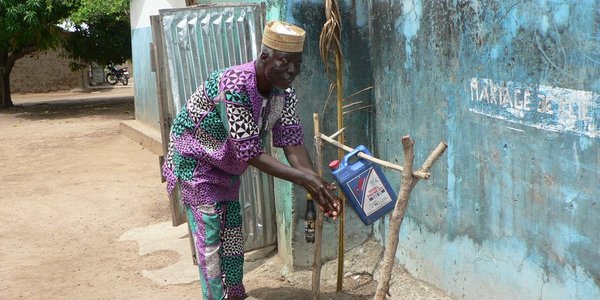 Read this article in French
Read this article in French- Share this article
- Subscribe to our newsletter
Handwashing saves lives – using clean water to fight COVID-19
The global COVID-19 pandemic once again illustrates that simple actions like regular handwashing with soap are important for our health and can protect us from a number of diseases. However, in countries in the southern regions of the globe, access to clean water may be a problem. This is also the case in rural Benin, something that Troukou Dorkas, a much-respected village leader in Téprédjéssi in northwest Benin, is fully aware of. "It's a matter of life and death. We're trying to save as many villagers as we can. That's why I go and talk to everyone personally, because some can't read or write,” Dorkas explains. “We're raising awareness so that everyone, particularly women, know how important regular handwashing with soap is in order to fight the virus."
While the government updates Benin's urban population on protection measures and rules of conduct via TV and social media, in remote villages, little is known about the virus and its possible consequences. To address this issue, the SDC's Global Cooperation Department is running a targeted awareness campaign which also depends on the assistance of local village leaders.
From global dialogue to local action
Local ownership is key for development cooperation to have a sustainable impact in the countries concerned. The numbers clearly illustrate how acute the problem is. There are still 2.3 billion people world-wide who do not have adequate sanitation, despite the fact that 80 per cent of all diseases in low and middle-income countries are due to poor sanitary conditions. In many cases, poor water-supply infrastructure and inadequate sanitation result not from a shortage of water but rather from the absence of national and international funding to provide access to water of suitable quality in remote areas.
In order to address these issues, the SDC's Global Programme Water focuses on cooperation at various levels.
- At international level, it supports the political dialogue calling for global commitments on the water-related targets of the 2030 Agenda for Sustainable Development.
- At local level, it backs knowledge sharing to help ensure long-term access to clean drinking water and adequate sanitation for everyone.
When implementing specific activities, the SDC always involves local leaders like Troukou Dorkas or her colleague Simon Edjalawe in Benin. That is the only way to prepare sustainable and realistic prevention strategies and implement simple but effective solutions. "We have to fight the Covid-19 disease with what we have," says Edjalawe. "That's why the first thing we did was to build handwashing devices out of the materials we already had. Now there are two handwashing stations to every home: one at the entrance to the yard or the house and another next to the latrines.”
Training government representatives and villagers
Swiss support for better hygiene is not limited to provisional handwashing stations. One of the SDC's goals is to empower the governments of low and middle-income countries all over the world to solve their water supply problems. Switzerland has well-established and globally recognised expertise in water-related matters – particularly the installation of sanitation facilities – which needs to be included in the political dialogue with governments, the private sector and civil society.
In Benin, for example, the SDC is in direct contact with the country's health ministry via its local partner organisation Water Supply and Sanitation Collaborative Council (WSSCC). Through the WSSCC, the SDC is able to present prevention strategies and solutions to improve hygiene which have been developed together with villagers. In this way, Switzerland takes a targeted approach to supporting national programmes aimed at improving water supplies and sanitation facilities for the most disadvantaged. Strategic partnerships such as with the WSSCC allow Switzerland to carry out its global cooperation activities in other African and Asian countries, training hygiene officers like Troukou Dorkas in rural communities and supporting local radio awareness campaigns.
The global COVID-19 pandemic highlights how important international development cooperation in the water sector is.
(SDC/wi)





Add a comment
Be the First to Comment